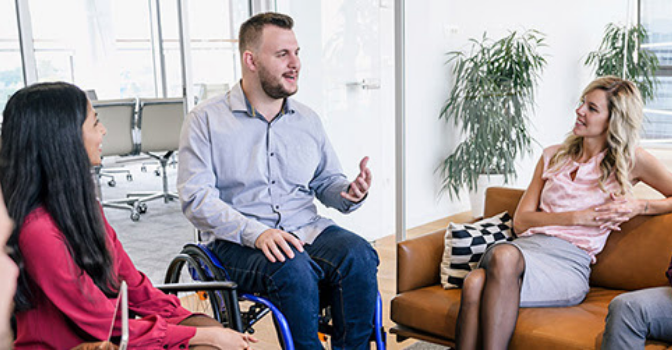Across Australia, more businesses are openly embracing gender, cultural and disability inclusiveness.
Creating a culture of inclusion for people with a disability means reducing barriers so everyone has an equal opportunity to contribute and thrive at work.
But talking about accessibility can be tricky. If you have a disability and need more support from an employer to make your workplace more accessible, here are some tips for starting the conversation.
Accessibility at work: What does it mean?
“Accessibility is all about removing barriers so that everyone has equal access,” according to JobAccess. That’s a fairly broad definition but it also comes with legal backing.
It is unlawful to discriminate against a person with disability in terms of access and use of commercial premises in Australia.[1] Businesses that discriminate against a person in employment because of a disability may also be breaking the law.
When it comes to the workplace, accessibility may refer to:
- Physical accessibility such as stairs, ramps, elevators, bathrooms etc.
- Lighting, visibility and signage
- Parking, building and floor access
- Access to technology, IT and software
- The tools needed to do your job.
Speaking up to get what you need.
Employee success and job satisfaction are in the best interests of employers, so removing barriers that prevent them from doing their job well is a win-win for everyone.
As an employee, often you may have to speak up to get what you need.
For example, if:
- Something changes in the workplace such as your team move to another location in the building or you’re asked to change workstations
- Your condition changes so you need to change your hours of work
- The equipment provided needs to be modified for you
- Changes to IT, systems or procedures will make them easier for you to access.
Keep in mind that your supervisor or employer may not know something is impacting your ability to do your job. Changes do not necessarily have to cost a lot of money and there may be financial support available for the business.
Obligations, accessibility and the law.
By law, you are only required to disclose that you have a disability if it affects your ability to do your job or the safety of you or another person. While disclosure is at your discretion, there may be times it is helpful to share information that will help an employer to help you.
An employer is required to make reasonable adjustments to eliminate barriers that enable people with a disability to more fully participate in employment. However, there are exceptions to this law. For more details, see our ebook, Inclusive employment: A comprehensive guide to creating a culture of inclusion for people with a disability in your organisation.
Tips to prepare for a conversation.
- Decide who to talk to. Approach your immediate supervisor first if you have a good relationship with them. If not, try your manager. If you need support, ask a colleague to attend with you.
- Think about the timing and location. Book a dedicated time so you are not rushed and have the person’s full attention.
- Plan the conversation, especially if you feel nervous. Make notes and jot down some key points so you don’t forget anything.
- In the meeting, explain the situation clearly. Provide examples and describe how the situation is affecting your ability to do your job.
- Explain what you would like the employer to do, such as help you to find a solution or implement a solution you have in mind. Be open to discussion. Give them time to investigate options and come back to you.
Useful resources.
The following resources may be useful for both people with disabilities and employers.
- Australian Government, Job Access
- Employer hub for employing people with a disability
- Funding for workplace changes – the Employment Assistance Fund
- Rights and responsibilities for people with a disability including how to talk to others and what to do if you’re discriminated against
- Leap in! free ebook, Inclusive employment: A comprehensive guide to creating a culture of inclusion for people with a disability in your organisation.
Want to find out more about accessible workplaces?
Initiatives such as the Inclusive Employment Movement which was co-founded by Leap in! and Comcare’s Collaborative Partnership are breaking down barriers and creating more accessible and inclusive workplaces. We’ve even created an ebook on inclusive employment, which you can download from the resources page on our website.
If you’d like to get in touch with our experienced team, call 1300 05 78 78, email crew@leapin.com.au or use the live chat feature on our website.
[1] Australian Government, JobAccess, Ensuring Accessibility in the workplace, 1 July 2016.
Further Reading
Inclusive employment: Latest Leap in! ebook.

